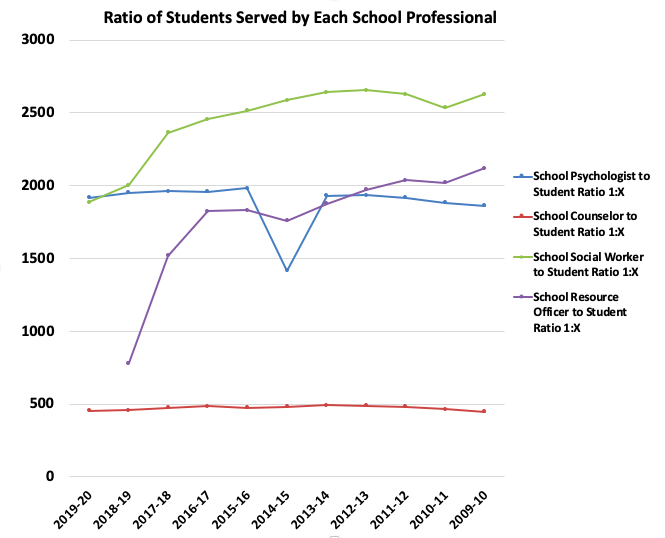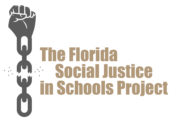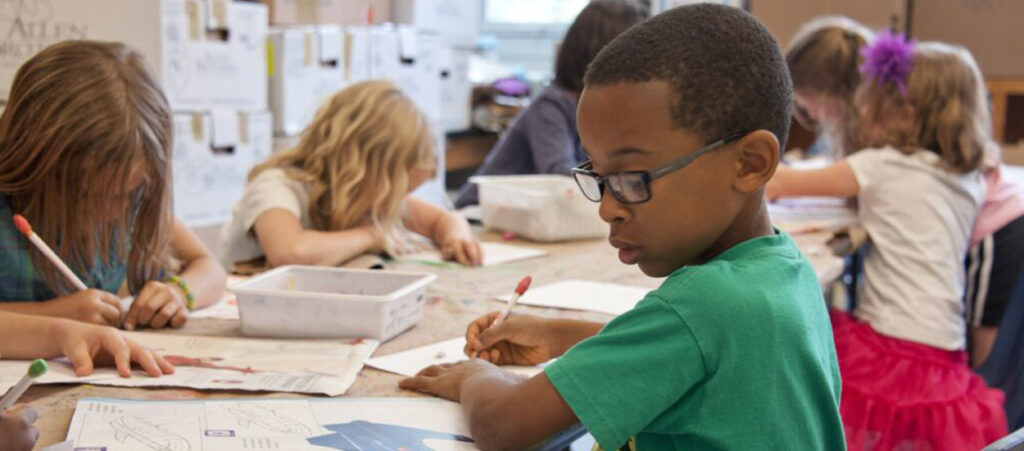School-based mental health professionals such as school counselors, school social workers, and school psychologists play a vital role in collecting and analyzing data regarding the emotional, mental health, and behavioral needs of youth, designing effective interventions to address those needs, promoting and supporting early intervention and preventative services, providing individual and group counseling, providing consultative services to teachers, and finally, coordinating community services to provide additional wrap around supports to families.[i]
Students today are reporting more stress than any other generation,[ii] as well as significant declines in mental health and increasing suicidality.[iii] Approximately 1 in 5 youth will develop a mental health concern warranting significant services in school.[iv] Only 20% of families will be able to access the care they need for their youth and, of those that do, 80% will access this care in schools.[v] The need for mental health services is great, but the resources often aren’t there.
The Framework for Safe and Successful Schools (2013) outlines the individual roles of school-based mental health providers well:
“School psychologists have a minimum of a specialist-level degree (60 graduate semester hour minimum) in school psychology, which combines the disciplines of psychology and education. They typically have extensive knowledge of learning, motivation, behavior, childhood disabilities, assessment, evaluation, and school law. School psychologists specialize in analyzing complex student and school problems and selecting and implementing appropriate evidence-based interventions to improve outcomes at home and school. School psychologists consult with teachers and parents to provide coordinated services and supports for students struggling with learning disabilities, emotional and behavioral problems, and those experiencing anxiety, depression, emotional trauma, grief, and loss. They are regular members of school crisis teams and collaborate with school administrators and other educators to prevent and respond to crises. They have specialized training in conducting risk and threat assessments designed to identify students at-risk for harming themselves or others. School psychologists’ training in evaluation, data collection, and interpretation can help ensure that decisions made about students, the school system, and related programs and learning supports are based on appropriate evidence.
School social workers have master’s degrees in social work. They have special expertise in understanding family and community systems and linking students and their families with the community services that are essential for promoting student success. School social workers’ training includes specialized preparation in cultural diversity, systems theory, social justice, risk assessment and intervention, consultation and collaboration, and clinical intervention strategies to address the mental health needs of students. They work to remedy barriers to learning created as a result of poverty, inadequate health care, and neighborhood violence. School social workers often focus on providing supports to vulnerable populations of students that have a high risk for truancy and dropping out of school, such as homeless and foster children, migrant populations, students transitioning between school and treatment programs or the juvenile justice system, or students experiencing domestic violence. They work closely with teachers, administrators, parents, and other educators to provide coordinated interventions and consultation designed to keep students in school and help their families access the supports needed to promote student success.
School counselors have a minimum of a master’s degree in school counseling. School counselors are generally the first school-employed mental health professional to interact with students as they commonly are involved in the provision of universal learning supports to the whole school population. School counselors have specialized knowledge of curriculum and instruction and help screen students for the basic skills needed for successful transition from cradle to college and career. School counselors focus on helping students’ address their academic, personal/social, and career development goals and needs by designing, implementing, and evaluating a comprehensive school counseling program that promotes and enhances student success. School counselors work to promote safe learning environments for all members of the school community and regularly monitor and respond to behavior issues that impact school climate, such as bullying, student interpersonal struggles, and student–teacher conflicts. Effective school counseling programs are a collaborative effort between the school counselor, teachers, families, and other educators to create an environment promoting student achievement, active engagement, equitable access to educational opportunities, and a rigorous curriculum for all students”
In the 2018-19 school year, one school psychologist served approximately 1,952 students, one school counselor around 459 students, and one school social worker served nearly 2,004 students. There were 17 districts with no school social worker and 13 districts with no school psychologists. These numbers are well above the recommended ratios for each (1 school counselor and 1 social worker for every 250 students[vi], 1 school psychologist for every 500 students[vii]).
Click here to see the data and trends for school-based mental health employment.




Recommendations for Policy Makers
- Your investments show your priorities. Your priority should be providing student with the mental health supports they need – the mental health assessment and intervention recommended by the U.S. Secret Service for keeping students safe.
Recommendations for Administrators
- Ensure that you have enough school-based mental health professionals to meet student needs.
- Remember those ratios are 1 school counselor and social worker for every 250 students and 1 school psychologist for every 500.
Recommendations for Educators
- Consult your school-based mental health professional (a school counselor, school social worker, or school psychologist) when you are in need of consultation for student behavioral, emotional, or mental health concerns.
Recommendations for Caregivers
- Just like teachers, if caregivers find themselves struggling with supporting their students’ behavioral, emotional, or mental health concerns, please consult your school-based mental health professional (a school counselor, school social worker, or school psychologist). We are here to help!
Resources
- Collaborative Position Statement by the Florida School Counselor Association, Florida Association of School Psychologists, & Florida Association of School Social Workers on Student Services Personnel, School Safety, & Student Mental Health
- Florida Association of School Psychologists Position Statement on School Psychologists as Mental and Behavioral Health Service Providers
- Florida Association of School Psychologists Position Statement on the Critical Shortage of School Psychologists
[i] National Association of School Psychologists. Framework for Safe and Successful Schools.
[ii] American Psychological Association. (2018). Stress in America: Gen Z. https://www.apa.org/news/press/releases/stress/2018/stress-gen-z.pdf
[iii] Twenge, J. M., Cooper, A. B., Joiner, T. E., Duffy, M. E., & Binau, S. G. (2019). Age, period, and cohort trends in mood disorder indicators and suicide-related outcomes in a nationally representative dataset, 2005–2017. Journal of abnormal psychology, 128(3), 185.
[iv]Youth Mental Health First Aid.
[v] National Association of School Psychologists. School-based Mental Health Services: Improving Student Learning and Well-being. https://www.nasponline.org/resources-and-publications/resources-and-podcasts/mental-health/school-psychology-and-mental-health/school-based-mental-health-services#:~:text=Good%20mental%20health%20is%20critical,being%20all%20improve%20as%20well.
[vi] American School Counselor Association https://www.schoolcounselor.org/press#:~:text=Student%2Dto%2DSchool%2DCounselor,Education%20Statistics%20is%20available%20here. National Association of School Social Workers. https://www.socialworkers.org/News/News-Releases/ID/1633/NASW-Highlights-the-Growing-Need-for-School-Social-Workers-to-Prevent-School-Violence#:~:text=School%20social%20work%20services%20should,suggested%20(NASW%2C%202012).
[vii] National Association of School Psychologists. (2013). Comprehensive School Safety Policies. file:///Users/angelamann/Downloads/NASP_School_Safety_Recommendations_January%202013%20(2).pdf

